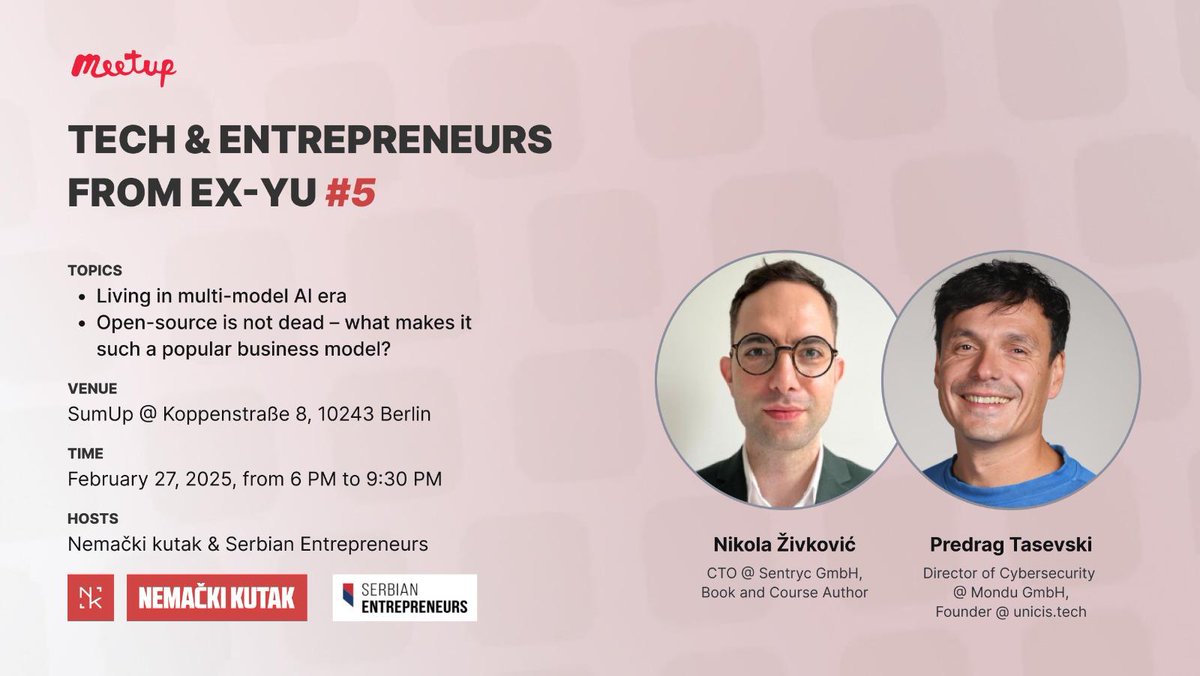- Published on
Open Source is NOT Dead: A Talk in Berlin
- Authors

- Name
- Predrag TASEVSKI
A Community Gathering on the Future of Open Source
On February 27, 2025, I had the privilege thanks for the invite from Filip S. Perišić to give a talk at an event organized by Nemački Kutak with support from SumUp in Berlin. The topic? "Open Source is NOT Dead – What Makes It Such a Popular Business Model?"
As an open-source advocate, cybersecurity expert, and founder of Unicis.Tech and open source Goverance, Risk and Complaince (GRC), I’ve witnessed firsthand how open source continues to evolve and thrive. This talk was a great opportunity to engage with a passionate audience and discuss the business viability of open-source software (FOSS).
Open Source is More Alive Than Ever
One of the biggest misconceptions about open source is that it’s just free code maintained by volunteers. In reality, open source powers over 96% of modern software—from Linux and Kubernetes to PostgreSQL and AI-driven frameworks. It’s also a massive industry, with companies like Red Hat, GitLab, and HashiCorp proving that open-source businesses can be billion-dollar enterprises.
In my talk, I walked through the evolution of open-source business models:
- 1990s-2000s: Open source as "free software"
- 2010s: The rise of open-core, SaaS, and managed services
- 2020s: AI-driven open-source innovation
How Open Source Businesses Make Money
A key takeaway was that open source does not mean “no money.” Here are some of the most successful business models in the space:
1. Support & Consulting (Freemium Model)
Red Hat started with free Linux distributions but monetized by offering enterprise support and services. This model led to its $34B acquisition by IBM in 2019.
2. Open-Core Licensing
GitLab offers a free version of its DevOps platform while keeping premium enterprise features behind a paywall. This approach helped it reach an $11B valuation. This is the business model that we selected a company that I founded Unicis, by proving premium and ultimate entperise features for money, and providing entperise futures for free such as Single Sing-On (SSO) for free, and not being excluded from the The SSO Wall of Shame.
3. Cloud & SaaS (Managed Services)
MongoDB, once fully open source, shifted to Server Side Public License (SSPL) and to a SaaS-first strategy with MongoDB Atlas. It now earns $1.5B+ in revenue.
4. Marketplace & Ecosystem
Companies like Hugging Face give away their AI models for free but monetize through enterprise features, training, and cloud APIs. They were valued at $4.5B in 2023.
The Role of Community & Developers
Open source thrives because of its community-driven nature. Developers contribute to projects because of passion, innovation, and professional growth. At the same time, companies benefit from:
- Free R&D and bug fixes
- Security audits from the global community
- Freedom from vendor lock-in
Big Tech both loves and exploits open source. For example:
- AWS forked Elasticsearch into OpenSearch after its licensing changes
- Google built Chromium as open-source, but Chrome remains proprietary
Good source of FOSS funding and support is the following repository.
The Future of Open Source Businesses
The discussion also touched on the future of open source:
- AI & Open Source – Can AI models remain open-source, or will proprietary AI dominate?
- Decentralized Funding – Platforms like GitHub Sponsors and Open Collective are changing how maintainers get paid.
- Hybrid Business Models – More companies will blend open-source licensing with cloud services.
Open Source is the Future
The open-source ecosystem will continue to grow because it enables faster innovation, security, and developer adoption. Many of the world’s most influential companies and organizations trust open-source software for compliance, transparency, and flexibility.
Want to Contribute?
Open source is not dying—it’s evolving. If you want to get involved, here’s how:
- Contribute to projects on GitHub or GitLab
- Support open-source maintainers through funding platforms
- Advocate for open-source adoption in your company
Thank you to Nemački Kutak, Filip and SumUp for organizing this fantastic event! Looking forward to future discussions and collaborations in Berlin, Brussels, Amsterdam, and beyond.
